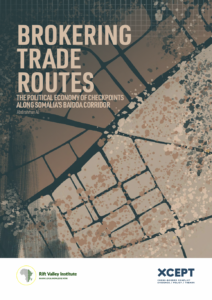THE POLITICAL ECONOMY OF CHECKPOINTS ALONG THE BAIDOA CORRIDOR
SUMMARY
• The Baidoa corridor is a transport and trade route that connects Somalia’s coastal capital, Mogadishu, to Kenya via the border towns of Bula Hawa and Dollow, respectively. As with all trade and transport routes in Somalia, there are many checkpoints along the route that are controlled by a variety of different political and security actors.
• The number of checkpoints along the Baidoa corridor has evolved over time. During the Siad Barre regime (1969–1991), checkpoints gradually multiplied, but it was after the regime’s collapse in 1991 that they proliferated, run by different clan militias. This continued until 2006 when the Islamic Courts Union (ICU) briefly took control of the corridor eliminating all militia checkpoints and reducing the many transit taxes to a single affordable fee. In 2008, al-Shabaab took over most of the corridor imposing its own taxation regime.
• Today, a growth in the number of competing authorities along the route – federal government, federal member states and al-Shabaab being the most significant – has led to a sharp increase in the costs of transportation of goods along the corridor. Checkpoint taxes now have a greater impact on transport costs than fuel prices, road conditions and the length of the route.
• Checkpoints play various roles in competing state-building efforts. While al-Shabaab maintains a sophisticated administration through just two checkpoints along the route, it uses checkpoints beyond revenue generation to discipline and punish people who are under the governance or control of competing authorities.
• In government-held parts of the corridor the situation is more complex. In the current configuration, clan militias retain a modicum of fiscal and political independence in exchange for pledging formal allegiance to a federal member state or the federal government. They wear government uniforms but little of the revenue they collect at checkpoints makes its way to the coffers of their respective administrative hierarchies.
• The physical presence of checkpoints along the corridor has given rise to a new institutional interface between traders and checkpoint operators. To navigate the different checkpoint authorities, traders rely on checkpoint brokers (dilaal), who negotiate and settle fees on their behalf. Brokers rely on their social and economic capital in federal member states and clan communities to facilitate smooth passage along checkpoints at a distance, without the lengthy delays that usually characterize checkpoint encounters.
• Checkpoints not only affect the profits of traders and transporters but distort the geography of trade flows. Businesspeople in Baidoa and the border towns of Bula Hawa and Dollow increasingly source goods from faraway ports, skirting the costs associated with double taxation along the Baidoa-Mogadishu corridor. This in turn depresses trade opportunities in Mogadishu.
This research paper is a product of the FCDO’s Cross-Border Conflict Evidence, Policy and Trends (XCEPT) programme, funded by UK aid from the UK government. XCEPT brings together leading experts to examine conflict-affected borderlands, how conflicts connect across borders, and the factors that shape violent and peaceful behaviour. The programme carries out research to better understand the causes and impacts of conflict in border areas and their international dimensions. It supports more effective policymaking and development programming and builds the skills of local partners.




